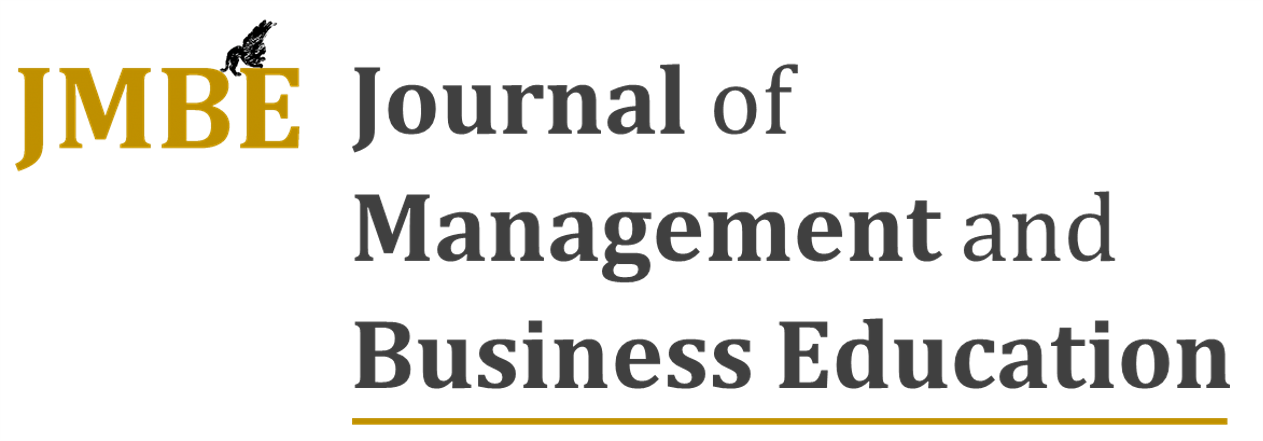Teaching in business administration: a customized process driven by technological innovations
DOI:
https://doi.org/10.35564/jmbe.2020.0002Keywords:
digital learning, learning analytics, tailored learning, artificial intelligenceAbstract
Three technological innovations are challenging higher education learning processes. This paper addresses the implications for these learning processes of interactive digital transformation, artificial intelligence, and content customization. These innovations involve three types of teaching and learning activity processes, digital learning, learning analytics and tailored learning. Our approach suggests relevant implications for carrying out teaching activities in the new scenario characterized by learning anywhere at any time. Furthermore, the digitalization process allows teachers to use data mining techniques to monitor students’ activity; this can be used as a basis for customizing delivered content. Last, a question agenda is proposed and further developments are examined based on the three parties involved in the learning process: students, teachers and delivered content.
Downloads
References
Barney, J. (1991). Firm Resources and Sustained Competitive Advantage. Journal of Management, 17(1), 99-120.
https://doi.org/10.1177/014920639101700108
Bigné, E.; Badenes-Rocha, A.; Ruiz, C. & Andreu, L. (2019). Blended training for teachers of online higher education. Journal of Management and Business Education, 2(2), 108-126.
https://doi.org/10.35564/jmbe.2019.0010
Bulger, M. (2016). Personalized learning: The conversations we're not having. Data and Society, 22.
Chung, T. S.; Rust, R. T. & Wedel, M. (2009). My mobile music: An adaptive personalization system for digital audio players. Marketing Science, 28(1), 52-68.
https://doi.org/10.1287/mksc.1080.0371
Hauser, J. R.; Urban, G. L.; Liberali, G. & Braun, M. (2009). Website morphing. Marketing Science, 28(2), 202-223.
https://doi.org/10.1287/mksc.1080.0459
Huang, M. H. & Rust, R. T. (2018). Artificial intelligence in service. Journal of Service Research, 21(2), 155-172.
https://doi.org/10.1177/1094670517752459
Kaplan, A. & Haenlein, M. (2019). Siri, Siri, in my hand: Who's the fairest in the land? On the interpretations, illustrations, and implications of artificial intelligence. Business Horizons, 62(1), 15-25.
https://doi.org/10.1016/j.bushor.2018.08.004
Litterio, A. M., Nantes, E. A., Larrosa, J. M., & Gómez, L. J. (2017). Marketing and social networks: a criterion for detecting opinion leaders. European Journal of Management and Business Economics, 26(3), 347-366.
https://doi.org/10.1108/EJMBE-10-2017-020
Liu, D.; Bhagat, K. K.; Gao, Y.; Chang, T. W. & Huang, R. (2017). The potentials and trends of virtual reality in education. In Virtual, augmented, and mixed realities in education (pp. 105-130). Springer, Singapore.
https://doi.org/10.1007/978-981-10-5490-7_7
Mora, J.G. (1991). Calidad y rendimiento en las instituciones universitarias. Consejo de Universidades, Madrid.
Popenici, S. A. & Kerr, S. (2017). Exploring the impact of artificial intelligence on teaching and learning in higher education. Research and Practice in Technology Enhanced Learning, 12(1), 22.
https://doi.org/10.1186/s41039-017-0062-8
Rust, R. T. & Huang, M. H. (2014). The service revolution and the transformation of marketing science. Marketing Science, 33(2), 206-221.
https://doi.org/10.1287/mksc.2013.0836
Sein-Echaluce, M. L., Fidalgo-Blanco, Á., García-Peñalvo, F. J. & Conde, M. Á. (2016). iMOOC Platform: Adaptive MOOCs. In International Conference on Learning and Collaboration Technologies, pp. 380-390. Springer, Cham.
https://doi.org/10.1007/978-3-319-39483-1_35
Somyürek, S. (2015). The new trends in adaptive educational hypermedia systems. International Review of Research in Open and Distributed Learning, 16(1), 221-241.
https://doi.org/10.19173/irrodl.v16i1.1946
Sunar, A.S.; Abdullah, N.A.; White, S. & Davis, H. C. (2015) Personalisation of MOOCs: the state of the art. In Proceedings of the 7th International Conference on Computer Supported Education - Volume 1: CSEDU. Scitepress. pp. 88-97
https://doi.org/10.5220/0005445200880097
Virtanen, M. A.; Haavisto, E.; Liikanen, E. & Kääriäinen, M. (2018). Ubiquitous learning environments in higher education: A scoping literature review. Education and Information Technologies, 23(2), 985-998.
https://doi.org/10.1007/s10639-017-9646-6
Zawacki-Richter, O.; Marín, V. I.; Bond, M. & Gouverneur, F. (2019). Systematic review of research on artificial intelligence applications in higher education-where are the educators? International Journal of Educational Technology in Higher Education, 16(1), 39.
Downloads
Published
How to Cite
Issue
Section
License
Copyright (c) 2023 Journal of Management and Business Education

This work is licensed under a Creative Commons Attribution-NonCommercial-ShareAlike 4.0 International License.
License terms at: https://creativecommons.org/licenses/by-nc/4.0/legalcode




